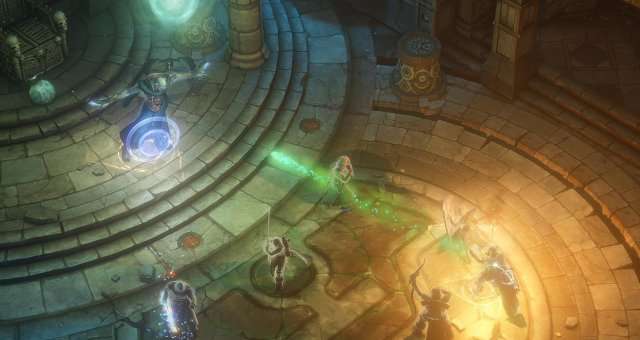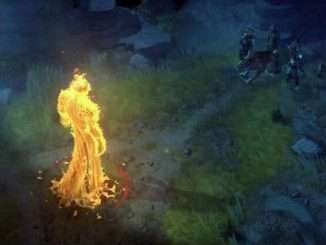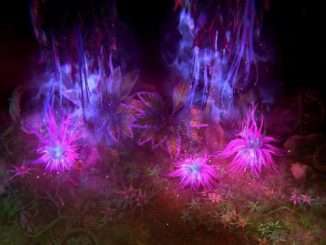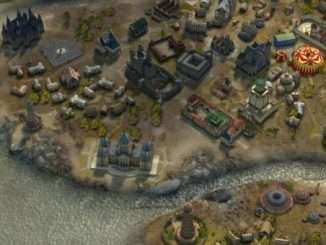
I see that some players are struggling to build efficient spellcasting classes.
Thus this guide to help for wizard build which is IMO the best class in the game as a force multiplier.
Note: This is a guide for beginner and intermediate players, custom difficulty setting (challenging with normal enemies to stay close to the PnP), it does not intends to be the most optimized / efficient build of all time.
Other Pathfinder: Kingmaker Guides:
- Beginners Guide.
- Statue Puzzle Solution.
- How to Defeat Tartuccio (The Kamikaze Strategy).
What is the Role of a Wizard?
The most interesting trait of a wizard is its capacity to learn spells from scrolls which means that you’ll eventually be able to cast all the arcane spells in the game.
As a lot of you have understood, the key to win encounters in pathfinder is to be able to have the “rights” answers to an encounter.
For example:
- Big enemy HP pool / swarm => AOE spells: Fireball / Molten Orb / Lightning bolt, etc.
- Very high AC / damage resistant ennemies => Unmissable damage: Magic Missile…
- Disable ennemies => Color Spray / Hold Person / Web etc.
- Need strong melee buff / resist => Haste / Heroism etc.
- Enemies pelter you with elemental damage? => Resist Energy / Protection from Energy.
A wizard is a specialised instrument. Its spells are few at first but each of them really have the potential to change the way an encounter plays.
Also it can easily counter the “few spells weakness” as it has the ability to use wand and scrolls (even divine ones) so it can cover all the spellcaster roles, meaning more flexibility in your party composition.
Unlike in the other RPGs in this game the hoarding / selling limited use gear mentality is not that profitable.
You shall think of your wizard as a tactical battle platform able to do amazing burst damage. You want the encounters to be short and lethal (for you foes).
On a side note its skills are amazing thanks to the high intelligence, and will probably be on cooking duty until the end of its days!
So How Do I Become the Next Raistlin Majere?
The following build is an example for the early levels (as they are the most difficult) of a damage dealer oriented wizard with strong disables and buffs.
It may not be the most optimized way to play (as a disabler focused wizard may be more effective) but I find the disabling spells strong enough not to need a lot of feats investment (at least in the early game).
Also more dakka is always good.
Character Creation
Race: Human
Class: Wizard (Wizard)
School: Evocation (Intense spells (+damage) means that even your low level damage spells will stay relevant even far into the game).
Also most of evocation spells trigger an opposite save check so they benefit A LOT from the added difficulty.
Bond: Strong choices are: Object (spell refresh) / Lizard (+ AC) / Rat (+ Fortitude save which will very probably be your weak one).
Stats:
- STR – 8
- DEX – 16
- CON – 10
- INT – 18 (20)
- WIS – 10
- CHA – 10
Skills:
Very much dependent on your party, the only mandatory are Arcana / World / Use Magic Device. The rest are useful when you have to play your MC alone.
- Arcana *
- World *
- Use Magic Device *
- Religion
- Persuasion
- Perception
Feats:
- Point Blank Shot.
- Precise Shot (Need PBS, near the end of the list, else casting a spell on an enemy in melee will have a -4 penalty).
- Spell Focus (Evocation).
- Opposition schools: Necromancy / Divination (early spells are less potent and later if you really need them the 2 slots are not that penalizing).
Spells:
- Do not take Magic Missile and Mage Armor you start with scrolls on your character and can learn them right at the start.
- Others easily found scrolls until the Stag lord are: vanish / ray of enfeebelment / ray of sickening / snowball / corrosive touch / enlarge person / summon monster one.
- There may be others but this covers most of the useful basics for the first encounters.
So chosen spells are:
- Burning hands (only early AOE damage / swarm killer for fangberries).
- Color spray (GREAT disabler, few early ennemies have high will save, strongest early game spell IMHO).
- Snowball, very good damage potential (1d6 per caster lvl).
- Ear piercing scream (very few monsters have sonic resistance).
- Shield (stacks with Mage Armor, VERY useful to have your AC 21 wiz, altough with careful positioning your wizard should very rarely be attacked, unfortunately it is personnal only).
- Hurricane Bow (useful at low levels to help clear all the trash mobs without using other spells, use with heavy crossbow for maximum love).
- Touch of Gracelessness (sometime useful disabler to lower the AC of an enemy, it’s a touch attack so be careful).
- Reduce person: Your tank’s friend, more AC and Dex.
Other useful lvl1 early spells:
- Magic Missile (see the dedicated section).
- Mage Armor (learn with scroll, useful if you find your mage too often engaged in melee, but with experience it should NEVER happen or only when ambushed with stealth ennemies).
- Summon monster I (useful only to divide ennemy attention if needed, cast as first spell BEFORE combat after the buffing phase next to the ennemies caster / ranged, as the duraction increase with levels it gets less bad with leveling).
- Enlarge person: Amiri’s friend (more size = more damage AND more range, so she can safely attack being behing tank back).
Be aware that Corrosive Touch / Shocking Grasp are MELEE touch attacks and thus you normally have less bonus to use them (also it’s a really bad idea to be in contact with your sorcerer as casting give attack of opportunities, you’re squishy as hell / always one crit away from death).
Early Game
Early Leveling:
- Lvl 3 – Weapon Focus (Ray) (+1 to hit with all your ranged spells VERY useful).
- Lvl 5 – Greater Spell Focus.
- Lvl 5 – Spell Specialization (great feat to empower your early damage dealing spells, also you can change the specialised spell on lvl up so it stays relevant) use with lesser empower metamagic rod / lesser maximize metamagic rod to abolutely blast enemies when needed.
Notable early game spells and their uses.
Level 2:
- Invisibility (one of the most potent early spell, it basically enable you to position your damage dealers on the sweet spots before starting an encounter (lets stays right next to the Stag lord spawn point for example), scout an area without much danger or even let you disengage a character in melee with less danger (not the mage).
- Acid Arrow (Lingering damage, great range, debatable as you can find scrolls but I leveled before finding one).
- Scorching Ray (Very good early damage, can absolutely wreck with metamagic rod, debatable as you can find scrolls but I leveled before finding one).
- Protection from Alignment, Communal (same as divine spell, great buff, although only early game as the deflection modifier and save are shared with Rings of Protections and cloaks).
- Web, Stop movement on failed reflex save, slows them nicely other wise, great for the harder enemies your tanks can’t hold.
- Blur. Tanks are now 20% more tanky! (20% miss chance).
- Burning Arc, also a garanteed hit spell, and chains too.
- Hideous Laughter, Great disabler for humanoid target if your divine spellcasters don’t have the Hold Person to spare.
Level 3:
- Fireball (BOOM, large AOE, PAY ATTENTION to where it lands! You do not want your tanks to eat your fireballs, great range you can ‘snipe’ far enemies).
- Haste (One more attack per character per round, increased move speed, insanely strong).
- Slow. Because kiting is sometime the answer, also force standard actions, meaning a lot less dps.
- Displacement: Blur big brother, your tank love story.
- Dispel magic. Removing that pesky unwanted buff.
Tips and Tricks
On hitting the enemies with spells / Spells missing target
A lot of spells need to perform a ranged touch attack.
Your bonus to hit is calculated with: Base Attack Bonus (half wizard level) + Dex Modifier + feats (Point Blank Shot / Precise shot (fire into melee), Weapon Focus (Ray) against the touch ennemy AC (without their Armor and Shield bonus but with Dex).
Thus Dex / Int bonus items are your go to (I even give the wizard the best dex boosting item as i find the benefit a lot more usefull than ‘just’ + X for the rogue, a missed CQC attack is not the end of the world but too much spell miss and you’re toast!)
Note: Weapons focus (Ray) applies to ALL ranged touch attack (and not rays only) so it is a very useful feat.
Magic Missile (MM)
Learned from a scroll, the first / second best 1st level spell. MM never misses! It means it’s garanted damage (unless the enemy uses Shield spell (rare) or is magic resistant (not early game). You can “brute force” a lot of early encounters by surviving long enough while MMing the strong / unhittable enemies.
You can easily find / buys wands / scrolls of it. Use with parcimony but it’s an easy ‘f*** it just kill them’ button for some ennemies.
Wands of MM can make a lot of classes without a good basic attack (namely all the buff oriented ones like bard and cleric) very relevant in fights (to finish near death enemies of chip away strong ones) with just a little Use Magic Device needed investment. Especially at the end of early game when their auto-ranged attack misses most of the time.
Rods
Rod are very powerful items especially the empower / maximize ones, at 9000 gp a piece (at Oleg Trading Post) it’s a bargain! Do not hesitate to buy several of them! To use you just have to activate the rod on the ability bar and then cast your spell.
Maxed out fireballs / scorching rays / magic missile will decimate your opponents!
Vary your spells!
Be sure to vary your spells in the saves they force on your opponents (will, fortitude, reflex). Most of the opponents, much like a character have a strong/medium/weak save type. Using the right spell is key to blast them easily.
Spell resistance
Not really a problem early game but spell penetration and G. spell penetration are a welcome addition in the mid/late game.
Be a cheapstake!
Try not to cast spells if possible:
- Seriously, never cast your usefull spells on trash mobs (kobolds / wolves / etc) spells are few and should be cast only if your CQC fighters are taking relevant damage / there is a dangerous threat that needs to be dealt with (difficult to access caster
- Think ahead: analyse WHY a specific encounter is difficult and select the appropriate answer. As a wizard you almost always have spells that unlock a difficult situation, or you can lean them. Wizard are by far the best power creeps in the game.
If you do this appropriately you almost never lack the needed spells for a hard encounter and also you don’t have to rest often (still had 55+ days after the Stag Lord and I took the time to explore entirely the available map before getting back to Restov).
Scout!
Casting Vanish and later Invisibility on your perception / trickery specialised member will allow him to recon a new area and identify the TTT (Theats / Traps / Treasures). Knowledge is key and does wonders on your save / reload ratio.
You should scout before resting! The workflow being scout => identify threats => adapt spells => rest => clean area => repeat as needed.
Party Composition
The wizard will be useful in almost every party composition which enable him/her NOT to be in melee.
Also it benefit greatly from the ability to have at least a few round (3+) for it spells to reach their maximum carnage potential.
For example my usual party composition is: 2 tanks ( Custom Tower shield specialists / Shield wall / Outflank (AC 30+)), 2 damage dealers CQC (Amiri + Rogue (precise strike / outflank)), 1 cleric (Tristan Heal/Buff), 1 wiz (MC).
I was able to slay through most of the Dire Narlmarches (greater werebeasts / giant slugs / wisps / viscount etc…) at level 4/5.
FAQ / Q&A / Notes
Wizard without Toughness feat? Constitution is too low!
While I would agree in a PnP setting in this game I find that the AI very rarely focus on the spellcasters if you engage correctly with your frontline, thus having “too much hitpoints” on the wizard is not a worthy investment.
I even begin to disregard applying mage armor / shield etc…
You’ll be decimated by AOE, ranged attacks, etc.
Resist Energy / Protection from Energy / Protection from Arrows, etc. are a way smaller investment than feats. If you find your wizard dying often it probably means that it is too close to the enemy or that it has have too few protection / disabling spells.
Initiative is too low!
If you’ve scouted properly you should never be taken by surprise and have the right buffs before combat is starting so the first round matter a lot less.





The second is the Support Mage, where the melee line is the primary damage dealing instrument.
It follows the maxim of war by Sun Tzu, where you direct your greatest strength against your enemys greatest weakness, or in case of mage, negate the enemys strength, thereby preventing him from using it against your weakness. Raw damage is only the secondary or tertiary purpose.
This means that if you can work out the puzzle, you need only one or two spells to win, and you have no need to blast continuously. It takes out the numbers game that Artillery Mage forces you into, and instead aims to break it, allowing you to punch above your weight, with the weakness of weakening the punch in encounters that are already easy.
The Support Mage is of course much harder to play and more often used by those who already have their tactics prepared by tabletop gaming.
Near Gravity, this is a very old debate, and not about Wizard vs. Sorcerer, but philosophical question about spellcaster roles within the party and the choice between wizard and sorcerer is defined by that philosophical stance.
The first one is the Artillery Mage: Caster is seen as primary damage dealer, a blunt instrument to hammer maximum damage through. In this case, Sorcerer is the only choice, as it allows more of the good stuff, and does not suffer from limited choice of spells, indeed, you only want one good one per level.
Good basic guide. However, decimating an enemy, that is, managing to kill an enemy exactly one out of ten times is not good in a game where they always fight to the last.
Compare to deciliter, one tenth of a liter, or decimal point, separating full and partial numbers into tenths.
For a military unit decimation is a huge moral blow and will prevent its effective use in battle and actually is very effective. In here, its not.
You’re missing some of the best lvl 1-3 spells:
lvl 1 Grease: amazing disable that stays relevant all game long. Disables even lvl 18 Golems, and they have to save every round. Probably the best lvl 1 spell, period.
lvl 2 Glitterdust: Targets will, which not many good disables do. Blindness is not only debilitating for attackers, but also allows everyone to sneak attack the blinded enemy.
lvl 3 Stinking Cloud: Probably the most important disable in the game. Will trivialize even extremely difficult encounters. Fortitude save every round, fail a save an be disabled for as long as you stay in the cloud. And since enemies never move out on their own, that means you win. This spell is worth casting even if the enemy only fails the save on a natural one.
Also note that the school you specialize in does NOT give a bonus to DC in pathfinder. It’s just an extra spell slot.
Make a Sylvan Sorc with 1 level of Scaled Monk. Boom 99% better than any wizard.
What you should NOT do is waste the wizard’s awesome potential on spells that are wasteful, superfluous, or better delegated to other party members (such as sorcerers and divine casters). In particular, a Monster Tactician Inquisitor, a Sylvan Sorcerer and/or a Healing domain Cleric can take care of most of the party’s buff needs, while being powerful contributors in their own right.
As for the debate between “support mage” and “artillery mage”, it was moot in PnP and is doubly moot in a CRPG. It is a false choice. In reality, there is nothing to choose except THE MOST POWERFUL OPTION. To quote a certain Lich, “POWER EQUALS POWER”, and it doesn’t matter which form the power takes.
The wizard is perfectly suited to be both “artillery”, with his massive AOE and single target DPS, and “support”, with a selection of powerful buffs, debuffs and defensive spells. There is absolutely zero reason to gimp an arcane caster by denying him the ability to Fireball an enemy group before battle starts, or to one-shot a boss with sneak attack rays. Likewise, there is no reason to not use a few “support” spells as a force multiplier.
How can you make a “Wizard Guide” and NOT mention:
– The ARCANE TRICKSTER (best damage output of any mage class)
– The THASSILONIAN SPECIALIST (+1 spell slot for each spell level)
– The NON-HUMAN RACES (what feat is so great that it’s worth losing +2 DEX and racial abilities?)
ALL of these must be either chosen or planned for since level 1, so even if your guide is for the first few levels only, you’ve still failed to inform readers of some of the most vital choices for their builds.
Wizard is useful specifically due to its versatility. With that said, I expected more of an analysis of schools(kinda important), but…it’s not a bad guide. Average and it will see you through most under Unfair runs easily. And, yes, it is written mostly with Sorcerer mentality, but this here Black Dragon also has a Sorc mentality.
Abjurer is ridiculously good if paired with respecced Tristan(into Primary Fire ofc). Also take Octa or Ekun and you don’t need more than 3 characters. Abjurer is your “Bubble Mage” that also takes care of nasty stuff, Tristan is Heal + AoE Damage(Fire P + Heal S, ofc) and Ekun is Single Target(and his wolf is somewhat a Tank). This is applicable to most Schools and doesn’t involve your typical Blaster AT / Sorc mentality.
i dont understand people buffing CON to mages. leave mages CON to min! use reduce person on mage and with high dex, plus blur/displacement/ similar spell youre untouchable. when status expires enemies are usually already decomposed. so basicaly you only have to worry about casting time. great guide!